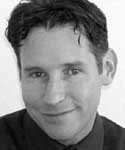-
- U.S. reaches disappointing milestone in AIDS epidemic
- Efforts intensify to end ban on openly gay soldiers
- Conservative Salt Lake City has surprisingly high gay population
- Mass. same-sex marriage initiative expected to change dynamics of debate
- Sex, lies and schools in ‘The Education of Shelby Knox’
- Iowa Supreme Court refuses to tamper with termination of civil ruling
- National News Briefs
- World News Briefs
commentary
Former cop’s book reveals past SDPD abuse of gays
Published Thursday, 23-Jun-2005 in issue 913
BEYOND THE BRIEFS: sex, politics and law
The former number-two man in the SDPD, Norman Stamper, has written a book called Breaking Rank. It blows open the door on police corruption here and elsewhere, and it details SDPD police abuse of gays from the ’70s through the ’90s.
Some in the GLBT community would apparently like us all to forgive the blatant abuse of gay men by police in prior years. We can’t. There are gay men who still have criminal convictions or illegal arrests on their records for doing nothing more than being in a place where gay men and women congregated. There are police still on the force who either engaged in the abuse or tacitly tolerated it by not blowing the whistle on the cops doing the abuse.
I agree things are better now, especially with Chief Lansdowne, but as Stamper shows, law enforcement is still a white male culture, highly prone to homophobia, and it needs to be kept in check.
In Breaking Rank, Stamper describes his experiences combating hatred of gays by police. He worked within SDPD for close to 30 years, leaving SDPD when he was the second-in-command to then-Chief Bob Burgreen. While Stamper was the choice of the GLBT community to succeed Burgreen in 1993, then-City Manager Jack McGrory selected Jerry Sanders.
Stamper describes in detail working for the Sex Crimes unit back in the late ’60’s.
A commanding officer tells Stamper that the “chief wants the fags cleaned out of Balboa Park. That’s a job for the Pink Berets.” He was referring to a group of officers whose job it was to find gay men typically having oral sex in Balboa Park restrooms, usually late at night.
Stamper indicated these men were arrested for indecent exposure, public sex and sodomy, which, even though consensual, was a felony. Virtually all the crimes required the men to register as sex offenders.
“… law enforcement is still a white male culture, highly prone to homophobia, and it needs to be kept in check.” Stamper would go on to make some 60 arrests in Balboa Park restrooms in a matter of a few weeks. In one account, he reports how one arrestee became violent and nearly killed him. Luckily, another arrestee, a gay man, came to Stamper’s aid – and saved his life. Stamper recalls how some of his arrestees were professionals, members of the clergy, or young men in the military. He relates how they shook and appeared nervous, perhaps knowing that their careers would be ending with their arrests.
Because of his success record, Stamper received an award from the commanding officer. The officer made a speech in front of dozens of officers, and in his speech the commander made double entendres, such as “Stamper bent over backwards to make these arrests” and “He really blew the lid on this one.” Stamper recalls how he smiled, but inside he was sick.
When the Stonewall riots occurred in New York in 1969, Stamper recalls San Diego’s own problem with police hatred of gays. “I’d seen the same in San Diego, at the Brass Rail: vice cops demeaning and baiting gay men, arresting them on trumped up charges, pushing them around or beating them up.”
Not only weren’t there any openly gay cops in the ’60s, ’70s and ’80s, but the department had a policy of not hiring them. And to ensure none got hired, Stamper said during the screening process police officials hooked him up to a lie detector and asked if he had ever committed “an unnatural sex act,” such as having sex with a barnyard animal or another man. The cops were confident that those who lied wouldn’t ever become cops. In fact, there were no openly gay cops at SDPD until John Graham came out in 1991.
Of course, also at this time, there were no anti-bias laws that protected gays and lesbians. So asking such questions was not unlawful, nor was firing someone for being gay or lesbian.
These experiences obviously shaped Stamper’s perceptions about policing. He felt compelled to combat bias by police against gays.
In the ’90s, he maintains that SDPD, under his leadership and Burgreen’s, became one of the most progressive policing agencies in the country. That’s when he started a citizens’ patrol to combat hate crimes in Hillcrest and the department took a strong stance against gay bias practiced by the Boy Scouts.
Nevertheless, also in the ’90s, after Stamper’s departure, arrests of gay men and others by aggressive vice officers continued.
Stamper’s candid and detailed accounts require a formal inquiry by the Attorney General’s Office. At the very least, Mike Aguirre should appoint something akin to LAPD’s “Christopher Commission,” which examined police corruption.
|
|
Copyright © 2003-2025 Uptown Publications


